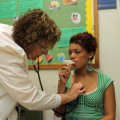
Earlier this week I made a familiar drive up Colorado Highway 85 to Fort Lupton from Denver. The trip made me nostalgic, as I was meeting with colleagues at Salud Family Health Centers for the umpteenth time. Nearly ten years ago, I made that same drive as I started day one of my very first “professional” job at Salud. I was joining the team at this storied community health center as a bright-eyed, recent college graduate anxious and excited to impact the health care field in important ways.
Back then, I knew I wanted to work in either the health care or public health sector, but I wasn’t quite sure how or in what capacity. I had finished all my requisite pre-med courses at the University of Denver in anticipation of potentially going to medical school, and I’d developed a keen interest in the public health profession through various internships and some coursework. As I took my new position at Salud, I had one goal in mind: gain clarity around my professional future. Luckily for me, my position was made possible by a national program that helps prospective health professionals do just that.
The Community HealthCorps is a little known yearlong service program that is part of the national AmeriCorps program. Not related to the much more prominent National Health Service Corps, each year the Community HealthCorps places 500 prospective health professionals in community health centers around the country to support health services and other programs while exploring various aspects of the community health center system.
In the face of ongoing data showing limited and varied health care workforce capacity in Colorado, programs like these are essential to creating a robust and well-functioning health care system. I’ve written about other workforce capacity programs in Colorado, and CCMU recently supported a bill in the state legislature which would support the development of family medicine residency programs in underserved areas of our state.
In a 2009 evaluation of the Community HealthCorps, two-thirds of program alumni reported that their service influenced their education or career choices. Surveyed alumni also noted that as a result of their service, they refined and focused their interest in a health career, became more committed to serving underserved populations, and developed an interest in public health advocacy. These results align well with my experience, as well as the experience of my cohort. In total, six of us went through the program with Salud in 2005; two of us are working in health advocacy, two are nurses, and two are primary care physicians.
During my time at Salud, which lasted just over two years, I was exposed to clinic operations, chronic disease management and health promotion programs, community engagement efforts, migrant farmworker health outreach, and numerous environmental health projects. I ultimately discovered that my passion for advancing population health and health equity far outweighed my desire to provide one-on-one medical care to patients. The rest, as they say, is history.
The vision of Community HealthCorps is “to become a national service pipeline for careers…that improve access to necessary primary and preventive care services for the medically underserved,” so it’s appropriate that I’ve since landed at the Colorado Coalition for the Medically Underserved. It seems my professional path was laid out before me just as they had intended. I owe much of that fulfilling path to the Community HealthCorps and my great mentors at Salud.




